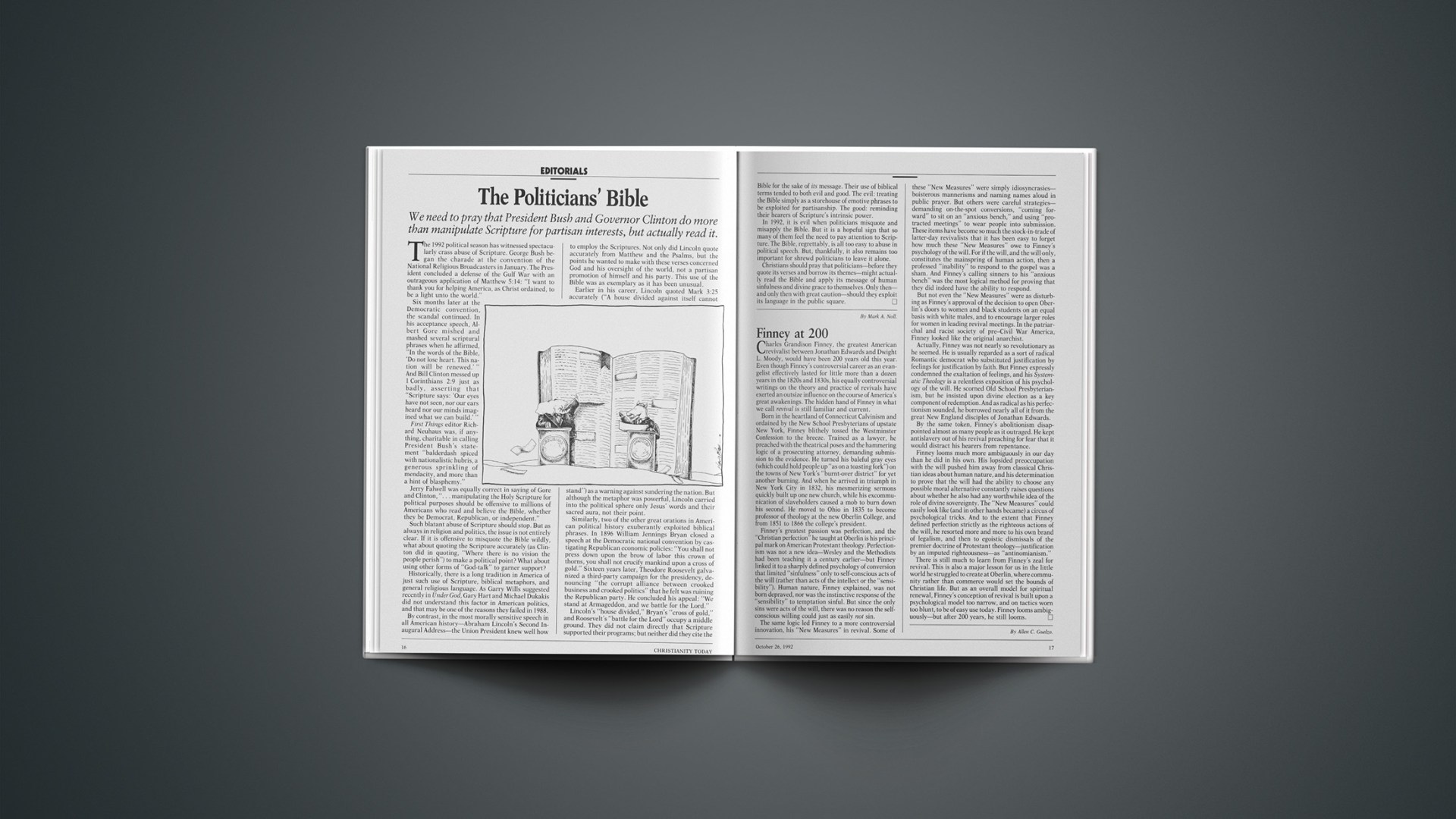The Politicians’ Bible
We need to pray that President Bush and Governor Clinton do more than manipulate Scripture for partisan interests, but actually read it.
The 1992 political season has witnessed spectacularly crass abuse of Scripture. George Bush began the charade at the convention of the National Religious Broadcasters in January. The President concluded a defense of the Gulf War with an outrageous application of Matthew 5:14: “I want to thank you for helping America, as Christ ordained, to be a light unto the world.”
Six months later at the Democratic convention, the scandal continued. In his acceptance speech, Albert Gore mished and mashed several scriptural phrases when he affirmed, “In the words of the Bible, ‘Do not lose heart. This nation will be renewed.’ ” And Bill Clinton messed up 1 Corinthians 2:9 just as badly, asserting that “Scripture says: ‘Our eyes have not seen, nor our ears heard nor our minds imagined what we can build.’ ”
First Things editor Richard Neuhaus was, if anything, charitable in calling President Bush’s statement “balderdash spiced with nationalistic hubris, a generous sprinkling of mendacity, and more than a hint of blasphemy.”
Jerry Falwell was equally correct in saying of Gore and Clinton, “… manipulating the Holy Scripture for political purposes should be offensive to millions of Americans who read and believe the Bible, whether they be Democrat, Republican, or independent.” Such blatant abuse of Scripture should stop. But as always in religion and politics, the issue is not entirely clear. If it is offensive to misquote the Bible wildly, what about quoting the Scripture accurately (as Clinton did in quoting, “Where there is no vision the people perish”) to make a political point? What about using other forms of “God-talk” to garner support?
Historically, there is a long tradition in America of just such use of Scripture, biblical metaphors, and general religious language. As Garry Wills suggested recently in Under God, Gary Hart and Michael Dukakis did not understand this factor in American politics, and that may be one of the reasons they failed in 1988.
By contrast, in the most morally sensitive speech in all American history—Abraham Lincoln’s Second Inaugural Address—the Union President knew well how to employ the Scriptures. Not only did Lincoln quote accurately from Matthew and the Psalms, but the points he wanted to make with these verses concerned God and his oversight of the world, not a partisan promotion of himself and his party. This use of the Bible was as exemplary as it has been unusual.
Earlier in his career, Lincoln quoted Mark 3:25 accurately (“A house divided against itself cannot stand”) as a warning against sundering the nation. But although the metaphor was powerful, Lincoln carried into the political sphere only Jesus’ words and their sacred aura, not their point.
Similarly, two of the other great orations in American political history exuberantly exploited biblical phrases. In 1896 William Jennings Bryan closed a speech at the Democratic national convention by castigating Republican economic policies: “You shall not press down upon the brow of labor this crown of thorns, you shall not crucify mankind upon a cross of gold.” Sixteen years later, Theodore Roosevelt galvanized a third-party campaign for the presidency, denouncing “the corrupt alliance between crooked business and crooked politics” that he felt was ruining the Republican party. He concluded his appeal: “We stand at Armageddon, and we battle for the Lord.”
Lincoln’s “house divided,” Bryan’s “cross of gold,” and Roosevelt’s “battle for the Lord” occupy a middle ground. They did not claim directly that Scripture supported their programs; but neither did they cite the Bible for the sake of its message. Their use of biblical terms tended to both evil and good. The evil: treating the Bible simply as a storehouse of emotive phrases to be exploited for partisanship. The good: reminding their hearers of Scripture’s intrinsic power.
In 1992, it is evil when politicians misquote and misapply the Bible. But it is a hopeful sign that so many of them feel the need to pay attention to Scripture. The Bible, regrettably, is all too easy to abuse in political speech. But, thankfully, it also remains too important for shrewd politicians to leave it alone.
Christians should pray that politicians—before they quote its verses and borrow its themes—might actually read the Bible and apply its message of human sinfulness and divine grace to themselves. Only then—and only then with great caution—should they exploit its language in the public square.
By Mark A. Noll.
Charles Grandison Finney, the greatest American revivalist between Jonathan Edwards and Dwight L. Moody, would have been 200 years old this year. Even though Finney’s controversial career as an evangelist effectively lasted for little more than a dozen years in the 1820s and 1830s, his equally controversial writings on the theory and practice of revivals have exerted an outsize influence on the course of America’s great awakenings. The hidden hand of Finney in what we call revival is still familiar and current.
Born in the heartland of Connecticut Calvinism and ordained by the New School Presbyterians of upstate New York, Finney blithely tossed the Westminster Confession to the breeze. Trained as a lawyer, he preached with the theatrical poses and the hammering logic of a prosecuting attorney, demanding submission to the evidence. He turned his baleful gray eyes (which could hold people up “as on a toasting fork”) on the towns of New York’s “burnt-over district” for yet another burning. And when he arrived in triumph in New York City in 1832, his mesmerizing sermons quickly built up one new church, while his excommunication of slaveholders caused a mob to burn down his second. He moved to Ohio in 1835 to become professor of theology at the new Oberlin College, and from 1851 to 1866 the college’s president.
Finney’s greatest passion was perfection, and the “Christian perfection” he taught at Oberlin is his principal mark on American Protestant theology. Perfectionism was not a new idea—Wesley and the Methodists had been teaching it a century earlier—but Finney linked it to a sharply defined psychology of conversion that limited “sinfulness” only to self-conscious acts of the will (rather than acts of the intellect or the “sensibility”). Human nature, Finney explained, was not born depraved, nor was the instinctive response of the “sensibility” to temptation sinful. But since the only sins were acts of the will, there was no reason the self-conscious willing could just as easily not sin.
The same logic led Finney to a more controversial innovation, his “New Measures” in revival. Some of these “New Measures” were simply idiosyncrasies—boisterous mannerisms and naming names aloud in public prayer. But others were careful strategies—demanding on-the-spot conversions, “coming forward” to sit on an “anxious bench,” and using “protracted meetings” to wear people into submission. These items have become so much the stock-in-trade of latter-day revivalists that it has been easy to forget how much these “New Measures” owe to Finney’s psychology of the will. For if the will, and the will only, constitutes the mainspring of human action, then a professed “inability” to respond to the gospel was a sham. And Finney’s calling sinners to his “anxious bench” was the most logical method for proving that they did indeed have the ability to respond.
But not even the “New Measures” were as disturbing as Finney’s approval of the decision to open Oberlin’s doors to women and black students on an equal basis with white males, and to encourage larger roles for women in leading revival meetings. In the patriarchal and racist society of pre-Civil War America, Finney looked like the original anarchist.
Actually, Finney was not nearly so revolutionary as he seemed. He is usually regarded as a sort of radical Romantic democrat who substituted justification by feelings for justification by faith. But Finney expressly condemned the exaltation of feelings, and his Systematic Theology is a relentless exposition of his psychology of the will. He scorned Old School Presbyterianism, but he insisted upon divine election as a key component of redemption. And as radical as his perfectionism sounded, he borrowed nearly all of it from the great New England disciples of Jonathan Edwards.
By the same token, Finney’s abolitionism disappointed almost as many people as it outraged. He kept antislavery out of his revival preaching for fear that it would distract his hearers from repentance.
Finney looms much more ambiguously in our day than he did in his own. His lopsided preoccupation with the will pushed him away from classical Christian ideas about human nature, and his determination to prove that the will had the ability to choose any possible moral alternative constantly raises questions about whether he also had any worthwhile idea of the role of divine sovereignty. The “New Measures” could easily look like (and in other hands became) a circus of psychological tricks. And to the extent that Finney defined perfection strictly as the righteous actions of the will, he resorted more and more to his own brand of legalism, and then to egoistic dismissals of the premier doctrine of Protestant theology—justification by an imputed righteousness—as “antinomianism.”
There is still much to learn from Finney’s zeal for revival. This is also a major lesson for us in the little world he struggled to create at Oberlin, where community rather than commerce would set the bounds of Christian life. But as an overall model for spiritual renewal, Finney’s conception of revival is built upon a psychological model too narrow, and on tactics worn too blunt, to be of easy use today. Finney looms ambiguously—but after 200 years, he still looms.
By Allen C. Guelzo.









